Search the Special Collections and Archives Portal
Search Results

Proposal for the Xanadu Hotel and Casino (Las Vegas), October 30, 1975
Date
1975
Description
Binder containing the proposal for the Xanadu resort, including conceptual sketches, pictures of mockups, and detailed proposal documents. Unbuilt project. Page 75 of proposal is missing. Stamped or labeled on back of photos: "Photography by Julius Shulman. P.O. Box 46206 Los Angeles, California 90046." Julius Shulman, photographer.
Image
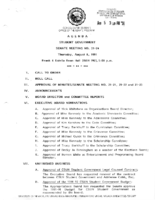
Meeting minutes for Consolidated Student Senate University of Nevada, Las Vegas, August 8, 1991
Date
1991-08-08
Archival Collection
Description
Includes meeting agenda and minutes along with additional information about bylaws. CSUN Session 21 Meeting Minutes and Agendas.
Text
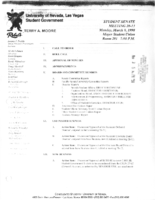
Meeting minutes for Consolidated Student Senate University of Nevada, Las Vegas, March 9, 1998
Date
1998-03-09
Archival Collection
Description
Includes meeting agenda and minutes.
Text

Interview with John Chapman Hopkins, April 11, 2005
Date
2005-04-11
Archival Collection
Description
Narrator affiliation: Physicist, Los Alamos National Laboratory; Test Director; J-Division Leader; Associate Director
Text

Interview with John Frederick Campbell, January 14, 2005
Date
2005-01-14
Archival Collection
Description
Narrator affiliation: Operations Mining Superintendent, Reynolds Electrical and Engineering Company (REECo)
Text
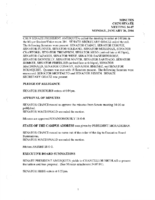
Meeting minutes for Consolidated Student Senate, University of Nevada, Las Vegas, January 26, 2004
Date
2004-01-26
Archival Collection
Description
Includes meeting minutes.
Text
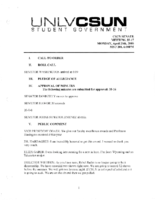
Meeting minutes for Consolidated Student Senate, University of Nevada, Las Vegas, April 25, 2005
Date
2005-04-25
Archival Collection
Description
Includes meeting minutes and agenda.
Text
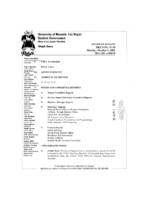
Meeting minutes for Consolidated Student Senate, University of Nevada, Las Vegas, October 01, 2001
Date
2001-10-01
Archival Collection
Description
Includes meeting minutes and agenda.
Text
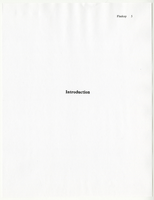
Jews Wandering in the Desert: A History of the Jewish Community of Las Vegas by Joel Fleekop, May 1, 2000
Date
2000-05-01
Archival Collection
Description
Joel Fleekop's senior honors thesis from Brandeis University titled: "Jews Wandering in the Desert: A History of the Jewish Community of Las Vegas."
Text

Interview with Philip Wymer Allen, August 26, 2004
Date
2004-08-26
Archival Collection
Description
Narrator affiliation: Meteorologist-in-Charge, Weather Bureau Research Station, Nevada Test Site
Text
Pagination
Refine my results
Content Type
Creator or Contributor
Subject
Archival Collection
Digital Project
Resource Type
Year
Material Type
Place
Language
Records Classification
